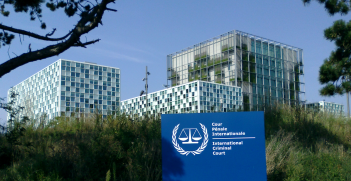Taking the Fight to ISIL

With the decision by the Australian government to go to war in Iraq having gained momentum with the recent arrest of alleged terrorists at home, Professor Ramesh Thakur argues that the logic behind this decision may not be so intuitive.
So we are off to war in the Middle East, again; that graveyard of Western interventions for over a century, whether good intentioned or ill. Except no one dare call it war, for fear of stirring up some scary ghosts from recent history.
The military response to the Islamic State (IS) is unexceptionable in principle, given the group’s existential threat to Iraq, massacre of religious minorities, celebration of “the extravaganza of brutality” in the words of Secretary of State John Kerry, and now the spread of their murderous reach to the Australian homeland. Contrary to some claims, the public statements of Prime Minister Tony Abbott and acting AFP Commissioner Andrew Colvin have been calm, firm yet reassuring in describing the threat and the steps being taken to deal with it. The same cannot be said of the inflammatory comments from some others.
Military action against IS in Iraq at government request does not violate international law. But US action in Syria, ruled out for us by Abbott, raises legal difficulties. Attempts to isolate Russia and demonise President Vladimir Putin are not going to help win Russian cooperation in the UN Security Council for dealing with President Bashar al-Assad. In yet another example of normative inconsistency, having harshly criticised Moscow for violating international law, Washington will do the same if it attacks targets in Syria without its (the Syrian Government’s) consent.
It would have been good to have a full and frank debate in parliament on the really hard questions to quieten history’s ghosts. Who is the enemy? The West seems to be picking fights with several simultaneously without prioritising. With IS as the chief threat, it would make sense to focus on the jihadists. Yet Congress has approved the president’s request for $500 million to aid the “moderate rebels” in Syria fighting Assad. This policy incoherence verges on strategic stupidity. Saddam Hussein’s Iraq, Muammar Gaddafi’s Libya and Assad’s Syria were among the most secular if brutal regimes. Toppling and destabilising them has let loose the monster of Islamist extremism now creeping outwards from the region.
It would seem better to put pressure instead on the regional regimes that bankroll, arm and support the jihadists, starting with Saudi Arabia. A Faustian bargain has helped the al-Saud family to rule domestically while the Wahhabis are allowed to propagate Salafist Islam through mosques in the Arab countries, Pakistan, Central Asia and Europe. Can Riyadh continue to fight IS while feeding the fundamentalist ideology that nourishes it? The proclamation of IS as the caliphate is a direct challenge to the Saudi claim of being the epicentre of the faith.
What is the military strategy? IS cannot be degraded and destroyed—the declared US goal—by air power alone. Senior administration and military officials have given contradictory answers to whether boots on the ground might be required or have been ruled out. IS cannot be defeated if the Arab countries’ will to do so is less than the West’s. Will the Arab regimes (especially Egypt and Saudi Arabia) as well as Turkey provide the ground troops? Perhaps the Egyptian military could put on hold killing its own people to take on IS instead?
What is the political strategy? The US response appears uncoordinated, confused and chaotic. Nicholas Kristof argues in The New York Times that Washington is returning to war in Iraq with an uncertain mission, unclear objectives, unknown timetable and unreliable allies (Australia excepted, of course). The commander-in-chief risks demotion from General Confusion to Major Disaster from lack of policy clarity. Without clear goals and means, there is serious risk of creating more jihadists, including on the home front, than are being killed, captured and neutralised. Terrorist killings spiked across Iraq, Afghanistan and Pakistan in the aftermath and as a result of the two wars begun in 2001 and 2003 and drone strikes. There is the further risk of the war on terror mutating into a self-perpetuating permanent war against a continually expanding list of enemies.
The political goal should be to marginalise the radicals until they shrink into extinction; foolish military means can instead radicalise the marginal and increase support and recruits for the jihadists by allowing them to paint the war, falsely, as one of the West on Islam. Abbott and police officers have been explicit in delinking extremists from the wider Muslim community, and Islamic religious leaders have been prompt and forthright in condemning IS brutality. Yet unease remains as to why IS set out deliberately to provoke Western military reaction with their gruesome beheading videos.
There is a sense of déjà vu all over again; the Einstein moment of repeating the same mistake over and over in the hope of a different result. For a century, the Middle East has been a favourite site of Western political interference, military intervention, air strikes and regime change. The balance sheet of abiding instability, volatility and rising anti-Western anger seems rather more substantial than illusory or transient gains. It might be worth considering a progressive disengagement and the alternative of non-interference as the default policy setting, especially as the West’s capacity to bully, bribe and inspire Middle Eastern rulers and peoples fades. Let the local leaders and people clean up their own mess instead of us adding to it.
Finally, the US as a global power has global responsibilities. Fair enough. But Australia is a regional power and the Middle East lies beyond our region. Especially if the Arab countries themselves are not going to contribute militarily, it is not clear why we should be involved there in any military operation instead of limiting our support to political and diplomatic backing; for example voice and vote in the UN Security Council. Participation makes us a target of jihadist attention. For action in our own region, this will always be a price worth paying. For action beyond our region, the added risk is not as obviously defensible.
Professor Ramesh Thakur is a former UN Assistant Secretary-General and Director of the Centre for Nuclear Non-Proliferation and Disarmament, Australian National University.




